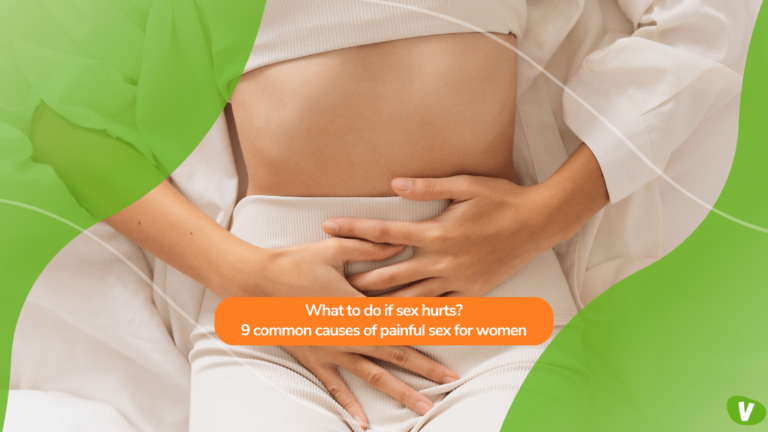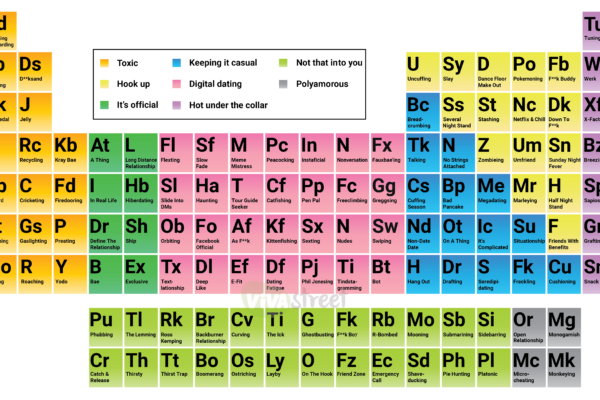Sex is all about feeling good. So, when it doesn’t, it quickly raises alarm bells.
But painful sex doesn’t just bring physical sensations. It can also leave women feeling ashamed and embarrassed, especially when needing to discuss the issue with a partner. However, experiencing this issue is more common than you think, and there are actually a lot of strategies to help you solve it.
- Common symptoms of painful sex
- 9 common causes of painful sex
- Strategies to lessen pain during sex
- When to see a doctor
- The takeaway
Before fixing the issue, you need to determine what causes it. This World Sexual Health Day, we’re focusing on the main causes of painful sex for women and how you can find a solution.
Let’s dive straight in.
Common symptoms of painful sex
If you’re experiencing painful sex, you’ll probably know about it. We’ll quickly go over common symptoms, though, as these will help you figure out the cause of the issue.
Painful sex can involve one or multiple of these symptoms:
- Pain with every penetration (including intercourse and inserting tampons)
- Pain only during sexual entry (penetration)
- Deep pain during intercourse
- Aching or burning pains
- Throbbing pains that last for hours after intercourse
Use these general categories to help you work out what’s causing your painful sex, so you can get back to having great sex and enjoying its benefits.
9 common causes of painful sex
Let’s jump to the specifics. Below are the common causes of painful sex, ranging from quick fixes to medical problems.
1. Not enough lube (vaginal dryness)
If you experience pain on entry, you might need more lubrication. There are a range of different reasons you may be experiencing dryness, and none of them are a reason to be ashamed.
Dryness can be caused by:
- Not enough foreplay
- Medications
- Hormonal birth control
- Hormonal drops (menopause or childbirth)
- Breastfeeding
This issue can simply be fixed by loading up on the lubricant – something we should all be doing anyway.
2. Irritation or injury
Another cause of entry pain is irritation, injury, or trauma. Pelvic surgery, accidents, or episiotomies typically cause this. If this is your issue, seeing a medical professional for expert guidance is best.

3. Inflammation, infection, and STIs
Infections, STIs, and general inflammation can also cause entry pain. A doctor should also examine this problem, as they can prescribe medication to cure the infection. Common causes here include UTIs, sexually transmitted diseases, eczema, or other genital skin disorders.
4. Vaginismus
Vaginismus occurs when the vaginal wall muscles randomly spasm resulting in painful sex. Today, more and more women are speaking out about this issue, and doctors can help those who suffer from it achieve comfortable penetration.
5. Illnesses and pre-existing conditions
If you’re experiencing deep pain or sharp pain with deep penetration, it could be caused by an illness or condition. You should see a medical professional to determine the exact cause.
However, deep pain can be caused by:
- Pelvic floor dysfunction
- IBS
- Retroverted uterus
- Endometriosis
- Pelvic inflammatory disease
- Cystitis
- Uterine fibroids
- Ovarian cysts
If you suspect you’re suffering from any of these issues, tackling these at the root rather than loading up on lube is best.
>6. Medical treatments
After recent surgeries or medical treatments, you’re more likely to experience deep pain during intercourses. For example, pelvic surgery, hysterectomies, and chemotherapy are common causes of deep pain. Your healthcare provider can offer personal advice and guidelines to help you navigate healing after these treatments.
7. Stress
Stress affects all aspects of our lives, including sex. If you initiate intercourse while stressed, your pelvic muscles may be tighter and can cause pain. It’s important to only engage in intercourse when relaxed to ensure the experience feels better physically and mentally.
8. Psychological issues
Psychological or mental health issues can also lead to painful sex, as they can lower arousal and lead to dryness or tighter vaginal muscles. Such issues include anxiety, depression, fear of intimacy, and low self-esteem. Working through these with a counsellor can help you tackle intercourse with more confidence.
9. History of sexual abuse
A history of sexual abuse can lead to pain during sex. Not everyone with a history of abuse experiences this, but it can affect some people. Professional therapy is the best course of action in this case.
Strategies to lessen pain during sex
If you’re ready to make sex more enjoyable, we’re here to help. These are the best at-home or self-help measures you can take to improve intercourse. However, before you try these, make sure you’ve considered the cause of your pain, as seeing a doctor might be your best route.
- Use lots of water-soluble lubricants
- Don’t rush intercourse; take lots of time to ensure you’re relaxed
- Experiment with lots of foreplay
- Communicate with your partner and explain your worries
- Relax before getting started by taking a bath, watching a film, or giving each other massages
- Experiment with different positions
Make sure you tell your partner what feels good and what doesn’t. Ask your partner to go slowly or stop completely if it becomes painful. Pushing through the pain won’t help.

When to see a doctor
If the home strategies don’t lessen your pain during intercourse, if you think an infection or medical condition causes it, it’s time to see a healthcare provider. This way, they can refer you to appropriate medications, relevant therapies, or to a specialist for a better diagnosis.
Before you see a doctor, prepare information about any medications you take, conditions you’ve experienced in the past, and information about painful sex. This information gives the professional everything they need to know to help you find a solution.
Finally, don’t be nervous. Though many of us find it uncomfortable to talk about sex, medical professionals are there to help you feel your best.
The takeaway
Hopefully, this guide has helped you pinpoint the cause of painful sex. Suffering from pain during sex isn’t pleasant, especially if it’s sudden and outlasts sex. But it’s a very common issue we need to discuss more – bookmark this article so you can share it later. It’s time to bust the shame!
Remember, if you’re in doubt, it’s always best to get yourself checked out by a doctor. Ruling out any serious issues will make you feel better and help you get back to pleasurable sessions.
Want to learn more? Read the latest sex and relationship content on our blog now.





